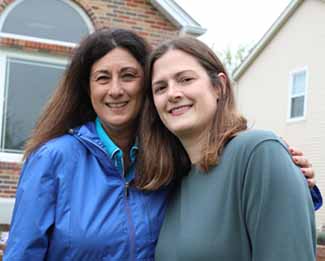Genetic Testing Saves Young Mom from Life-Threatening Kidney Cancer
November 29, 2023Categories: cancer, Loyola Medicine
Tags: Cancer, Loyola Medicine

MAYWOOD, IL – Genetic testing can be lifesaving for patients with increased risk of certain cancers, not just for themselves but also for other members of their family. While there has been extensive coverage of the benefits of the BRCA gene test to determine whether a woman has an increased risk of breast cancer, genetic testing for other diseases, including those that increase the risk of kidney cancers, can also be crucial.
After a lung collapse with a "pneumothorax" in 2016 (a collection of air between the lung and chest wall), Debra Teresi continued to experience health problems and was referred to pulmonologist Daniel Dilling, MD, director of Loyola Medicine's Rare Lung Disease Clinic. After taking a look at her CT scan, seeing cysts on her lungs and learning that her brother also had a history of pneumothorax, Dr. Dilling suspected a rare genetic disease called Birt-Hogg-Dubé Syndrome (BHD). He sent Debra for genetic testing that confirmed the diagnosis. BHD is a rare disorder that affects the skin and lungs and increases the risk of certain types of tumors, including kidney cancer. Fortunately, MRIs and ultrasounds of Debra's kidneys did not identify any tumors.
After learning she had BHD, Debra was concerned for her adult daughter, Kristy Stolarz. Debra's diagnosis meant there was a 50% chance Kristy had BHD too. A 2022 genetic test confirmed Kristy also had BHD. Although she had no symptoms, Dr. Dilling recommended tests including a CT scan of her lungs and an MRI of her kidneys. The MRI showed a tumor the size of a grapefruit in Kristy's left kidney. Urologic oncologist Gopal Gupta, MD, a specialist in genetic forms of kidney cancer, confirmed the tumor was cancerous. He performed a laparoscopic nephrectomy to remove the tumor before it spread to Kristy's lungs or lymph nodes. "If she hadn't found this disease when she found it," Dr. Dilling said, "this kidney tumor would have grown. It would have spread and threatened her life."
Kristy has two young children, ages 6 and 2, and is relieved she hasn't required any further treatment because the cancer was caught so early. "I love my mom and am grateful that she pushed me to go and get this genetic testing done. I'm just truly blessed honestly that I have people who care and doctors to work with…I mean they're heroes. I can't wait to be with my kids in the future, not have to think about what's next."
About Loyola Medicine
Loyola Medicine, a member of Trinity Health, is a nationally ranked academic, quaternary care system based in Chicago's western suburbs. The three-hospital system includes Loyola University Medical Center (LUMC), Gottlieb Memorial Hospital, MacNeal Hospital, as well as convenient locations offering primary care, specialty care and immediate care services from nearly 2,000 physicians throughout Cook, Will and DuPage counties. LUMC is a 547-licensed-bed hospital in Maywood that includes the William G. and Mary A. Ryan Center for Heart & Vascular Medicine, the Cardinal Bernardin Cancer Center, the John L. Keeley, MD, Emergency Department, a Level 1 trauma center, Illinois's largest burn center, the Nancy W. Knowles Orthopaedic Institute, a certified comprehensive stroke center, transplant center and a children’s hospital. Having delivered compassionate care for over 50 years, Loyola also trains the next generation of caregivers through its academic affiliation with Loyola University Chicago’s Stritch School of Medicine and Marcella Niehoff School of Nursing.
Established in 1961, Gottlieb Memorial Hospital is a 235-licensed-bed community hospital in Melrose Park that includes the Judd A. Weinberg Emergency Department, the Loyola Center for Metabolic Surgery and Bariatric Care, Loyola Cancer Care & Research at the Marjorie G. Weinberg Cancer Center, acute rehabilitation, a transitional care center, childcare center and fitness center. Founded in 1919, MacNeal Hospital is a 349-licensed-bed teaching hospital in Berwyn with advanced medical, surgical and psychiatric services and a 68-bed behavioral health program.
For more information, visit loyolamedicine.org. You can also follow Loyola Medicine on LinkedIn, Facebook, Instagram or X (formerly known as Twitter).
About Trinity Health
Trinity Health is one of the largest not-for-profit, faith-based health care systems in the nation. It is a family of 127,000 colleagues and more than 38,300 physicians and clinicians caring for diverse communities across 26 states. Nationally recognized for care and experience, the Trinity Health system includes 93 hospitals, 107 continuing care locations, the second largest PACE program in the country, 142 urgent care locations and many other health and well-being services. In fiscal year 2024, the Livonia, Michigan-based health system invested $1.3 billion in its communities in the form of charity care and other community benefit programs. For more information, visit us at www.trinity-health.org, or follow us on LinkedIn, Facebook, and X (formerly known as Twitter).
